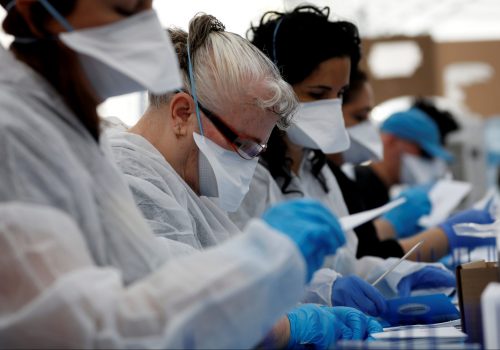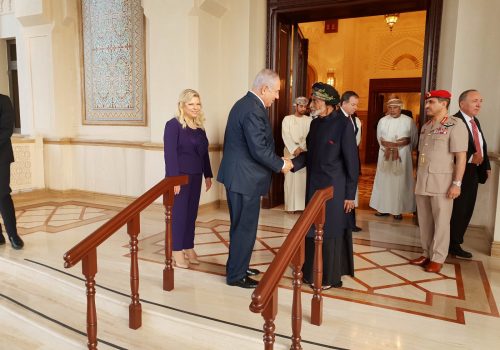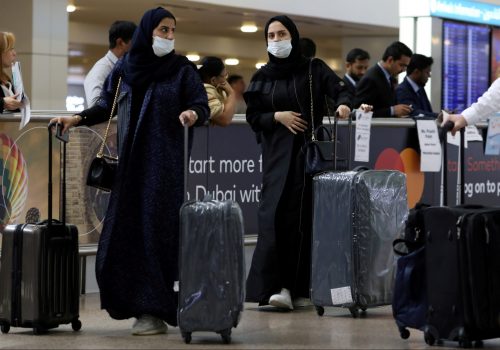Israel-Gulf ties, boosted by COVID-19 research, may trip over annexation plans
US policymakers should be aware that two pillars of their current Israel policy will come to a contradictory head if the joint coalition being formed by Prime Minister Benjamin Netanyahu and election rival Benny Gantz moves ahead with plans to annex parts of the West Bank.
On one hand, the Trump administration’s efforts to help Israel strengthen and “normalize” ties with the Arab world, particularly with states in the Gulf Cooperation Council (GCC), have been getting a boost from coordination between Israelis and Palestinians in battling the COVID-19 pandemic. On the other hand, Gulf Arab investors are likely to retreat from fledgling business ventures with Israel if Netanyahu riles the Palestinians by declaring sovereignty over any of the territory captured in the 1967 Middle East war.
Cooperating with Israelis is a slippery slope for Palestinians because they risk being accused of engaging in “normalization.” The term is among the most radioactive in the Mideast lexicon—akin to treason. It is applied with contempt to those who conduct business with Israel or otherwise cultivate ties at a time when its 53-year military occupation grows more rooted and efforts at a two-state solution have failed.
Just the whiff of a suggestion on social media that the Gaza Strip’s Hamas rulers were tolerating normalization led to the arrest of seven Palestinians who had organized a Zoom meeting with Israeli peace activists. The video conference was aimed at showing Israelis how the pandemic is making everyday life even worse for the tiny seaside territory’s 2 million besieged inhabitants.
In Ramallah, a Palestinian Authority (PA) spokesman said Israelis were “agents of this virus” and “exporting” illness by failing to ensure that the thousands of Palestinians workers in Israel who crossed back to the West Bank were free of infection. About three-quarters of the 313 cases in the West Bank were traced to Palestinian laborers who brought the virus back from Israel, PA officials said. Israeli government officials lodged a complaint about that statement, saying it was part of a campaign of incitement.
More broadly, normalization is a charge that has been hurled by Palestinians at leaders of the United Arab Emirates, Saudi Arabia, and other member-states of the Gulf Cooperation Council that have been steadily toning down their hostility toward Israel and investing in or working with Israeli-owned businesses, including WeWork and Zim Integrated Shipping Services. And nowhere is the word more toxic than in neighboring Jordan, one of only two Arab countries, alongside Egypt, that has signed a peace treaty with Israel. While government cooperation is close in the intelligence realm and Jordan buys natural gas from Israel, the air of hostility among the country’s Palestinians, who comprise a majority of its population, means business deals are handled with minimum publicity.
That is where the coronavirus is proving a disruptive element and could mute the demands for boycotts and sanctions that retard trade between Israel and the Arab world. Efforts to develop a vaccine against COVID-19 in Israel are attracting interest from investors across the Gulf and Israeli medical start-ups, in general, are hot at a time when venture capital money is otherwise drying up.
“Everybody is in a panic and there is huge curiosity in the Gulf to see what Israel is doing about it,’’ says Henrique Cymerman, the co-founder of a new group promoting regional trade—the Chamber of Commerce and Industry: Israel-Jordan-GCC.
Cymerman, a Portuguese-born Israeli citizen, told the author he started traversing the Mideast divide as a reporter for Spanish television. Over time, he turned into an adviser on Arab markets for Israeli businesses, becoming a frequent visitor to palaces and C-suites in Amman, Doha, and Riyadh. During the current coronavirus lockdown, he has been organizing Zoom sessions that include doctors and investors in Israel, Jordan, and the Gulf states.
Much of the interest has focused on Israel’s Migal Galilee Research Institute in the northern town of Kiryat Shmona, Cymerman said. The state-funded biotechnology center, located two miles east of the Lebanese border, issued a press release in late February announcing that the Israeli science minister had fast-tracked its efforts to produce a COVID-19 vaccine. These efforts involved adapting a vaccine the institute had developed for over four years for the poultry coronavirus known as IBV. The institute has also set up a commercial subsidiary called MigVax Ltd. to commercialize the vaccine if it gets regulatory approval. Asked about fundraising, a Migal spokeswoman said the company has received no investment from the Gulf.
Other Israeli business leaders, including Jerusalem Venture Partners founder Erel Margalit, a former member of parliament, have made similar observations about Gulf interest in COVID-19 research. But, still, as in the past, the delicate political terrain means Gulf investors who are deeply involved with Israel don’t want to be identified, Cymerman says.
Getting tarred as a normalizer may be particularly dangerous for Arab investors, since, Netanyahu clinched an agreement to head the new coalition government and is pushing ahead with his campaign promise to annex portions of the West Bank. Though cautioned against sabotaging the Trump peace plan unveiled in January, Netanyahu is working with US Ambassador David Friedman to produce a map of West Bank territory over which Israel could declare sovereignty with assurances of US support.
Palestinian negotiator Saeb Erekat reacted to news of the new Netanyahu government by calling for an international campaign to stop annexation, saying it would “end…any possibility for a negotiated solution.” Jordan’s King Abdullah has warned that taking such a step would be a “disaster” for Israel’s relations with his nation and other Arab countries.
For potential partners in the Gulf, “annexation would be a big problem,” Cymerman says. “Just when they want to get closer, this could bring about a complete freeze.”
For policymakers, the prospect of West Bank annexation posed by Israel’s incoming coalition government is a reminder of the eternal delicacy of Mideast peacemaking. At a time when Israeli-Gulf business dealings are proliferating, it explains why they have almost always been conducted in secret.
Jonathan H. Ferziger is a writer and researcher who covered Israel, the West Bank and Gaza for more than 20 years as a reporter for Bloomberg News. Follow him on Twitter: @jferziger.
Image: A healthcare worker holds a sample tube as they test Palestinian workers for the coronavirus disease (COVID-19), upon their return from Israel, outside the Israeli-controlled Meitar checkpoint, near Hebron in the Israeli-occupied West Bank April 7, 2020. (Reuters)


